#uses of artificial intelligence
Explore tagged Tumblr posts
Text
no i don't want to use your ai assistant. no i don't want your ai search results. no i don't want your ai summary of reviews. no i don't want your ai feature in my social media search bar (???). no i don't want ai to do my work for me in adobe. no i don't want ai to write my paper. no i don't want ai to make my art. no i don't want ai to edit my pictures. no i don't want ai to learn my shopping habits. no i don't want ai to analyze my data. i don't want it i don't want it i don't want it i don't fucking want it i am going to go feral and eat my own teeth stop itttt
#i don't want it!!!!#ai#artificial intelligence#there are so many positive uses for ai#and instead we get ai google search results that make me instantly rage#diz says stuff
139K notes
·
View notes
Text
Thriving In The AI Era

How Coditude's Developers Are Redefining Success in the AI Era
In the ever-changing tech landscape, the rise of generative artificial intelligence (AI) marks a profound shift in software development. Once confined to sci-fi, generative AI now leads innovation, transforming industries and developer roles. We're not just witnessing change; we're part of a revolution blending human creativity with powerful computing. This article examines how developers and AI synergize, exploring the uses of artificial intelligence, along with the challenges and opportunities, shaping the future of software development.
Understanding Generative AI
Generative AI, fueled by machine learning advancements, creates diverse content from text to images. Cloud computing's rise, exemplified by AWS, enables training complex AI models. Technologies like GPT-3 and Codex automate tasks, reshaping software development.
Generative AI challenges creativity and intelligence concepts, blurring lines between creators. Developers navigate AI's ethical and societal impacts while embracing its transformative potential. Generative AI augments human creativity, ushering in collaborative digital realms.
This future embraces a partnership between human ingenuity and machine intelligence, unlocking boundless possibilities.
Generative AI blurs lines between creators, challenging creativity and intelligence concepts. Developers navigate ethical implications while embracing its transformative potential.
Generative AI's Impact on Software Development
Generative AI revolutionizes software development, presenting new opportunities and challenges. It transforms how developers approach creativity and problem-solving. We explore its impact through real-world applications and developer perspectives.
Transforming Traditional Coding Practices
Generative AI, exemplified by tools like GitHub's Copilot, transforms coding practices by providing comprehensive code suggestions based on context. This departure from traditional programming accelerates development timelines, with developers reporting a 30% increase in productivity using AI-assisted tools. AI becomes a collaborative partner, generating sophisticated code snippets and reducing the need for extensive documentation and debugging.
Automating Documentation and Testing
Generative AI streamlines documentation by dynamically updating it based on code changes, enhancing code maintainability and reducing errors. In testing, AI-generated test cases cover diverse scenarios, improving software quality and reliability. This automation saves time and resources, transforming critical but tedious development tasks.
Case Studies: Real-world Applications
Generative AI drives diverse real-world applications in software development. For instance, a fintech firm modernized legacy systems by automating codebase conversion. Another startup enhanced user experience by dynamically generating interfaces based on user behavior data, boosting engagement.
Developer Perspectives: Opportunities and Challenges
Generative AI presents vast opportunities for software development, yet developers face challenges such as over-reliance and code originality concerns. Striking a balance between leveraging AI for productivity and maintaining a deep understanding of codebases is crucial.
Moreover, integrating generative AI raises questions about intellectual property rights and code ownership, given the complexity of determining the origin of AI-generated code snippets. Despite these challenges, generative AI transforms development by automating tasks, facilitating code generation, and expanding creative possibilities. However, navigating this landscape requires a thoughtful approach, an understanding of AI capabilities and limitations, and ongoing discussions about ethical implications.
Navigating the Generative AI Landscape
Integrating generative AI into software development requires a cultural shift, prompting developers to reevaluate skills and approaches for strategic adaptation in this new era.
Updating Skills and Knowledge
Generative AI demands skills beyond traditional programming, emphasizing AI fundamentals, data literacy, collaborative work, and ethical AI use.
Integrating Generative AI into Development Workflows
Successful integration entails incremental adoption, fostering a culture of experimentation, continuous learning, and balancing AI with human expertise.
Evolving Role of Creativity
Developers pivot towards creative problem-solving and strategic thinking, leveraging AI for experimentation and focusing on system architecture and user experiences. Interdisciplinary collaboration becomes vital as coding, design, and user experience converge in AI-driven applications.
Navigating generative AI demands technical proficiency, ethical awareness, and forward-thinking. Developers unlocking new possibilities for innovation and collaboration, shaping the future of technology in the digital age.
Future Workforce and Generative AI
Generative AI reshapes software development by altering job markets, skill requirements, and work nature, profoundly impacting the future workforce.
Balancing AI Automation
Generative AI impacts software development employment by automating tasks but also creating opportunities for human expertise to excel, emphasizing a need for a balanced approach where AI enhances human capabilities.
Impact on Developer Job Market
The job market shifts towards roles emphasizing oversight and creative use of AI tools, with traditional coding jobs evolving to focus on designing AI algorithms and integrating AI into system architectures, highlighting the need for adaptability and continuous learning.
Preparing Next-Gen Developers
Educational institutions adapt by incorporating AI fundamentals, ethical AI use, interdisciplinary skills, and lifelong learning into their curricula.
Overcoming Challenges and Ethical Considerations
Generative AI's rise in software development poses challenges and ethical dilemmas, from technical hurdles to philosophical considerations. Navigating this new era demands addressing these issues while upholding ethical standards, crucial for the development community and society.
Addressing the Fear of Obsolescence
Developers combat obsolescence fears by emphasizing irreplaceable skills like creative problem-solving and ethical decision-making. Lifelong learning ensures their continued relevance in an AI-driven future.
Navigating the Hype Versus Reality
Amidst utopian and dystopian narratives, a balanced view of generative AI is crucial. Stakeholders prioritize real-world utility over hype through rigorous testing and validation, ensuring genuine innovation.
Ethical Considerations and Responsibility
Generative AI presents ethical concerns like data privacy and algorithmic bias. Developers must prioritize transparency, accountability, and fairness in AI use to ensure responsible and equitable outcomes. This approach unlocks the true potential of AI while addressing ethical challenges.
Concluding Thoughts
The advent of generative AI marks an exciting yet challenging era in software development. As developers, we must harness this technology while navigating its ethical complexities. At Coditude, we recognize the importance of human creativity alongside AI's power, fostering an environment where developers can excel. By prioritizing continuous learning, ethical AI use, and a culture of innovation, Coditude is shaping the future of software development. Join us to be part of a community driving the generative AI revolution and creating a future where human ingenuity thrives.
#artificial intelligence#ai technology#generative ai#ai applications#future of ai#machine learning ai#future of artificial intelligence#about artificial intelligence#uses of artificial intelligence
1 note
·
View note
Text
Penguin Random House, AI, and writers’ rights
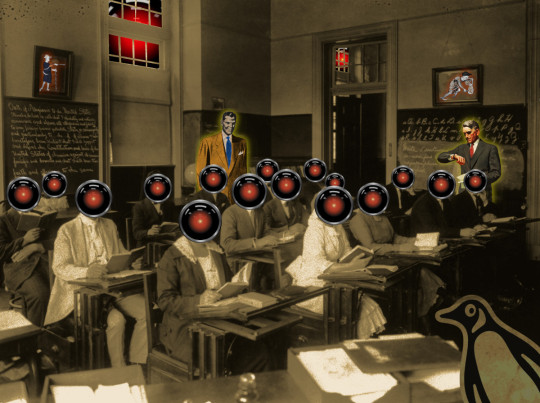
NEXT WEDNESDAY (October 23) at 7PM, I'll be in DECATUR, GEORGIA, presenting my novel THE BEZZLE at EAGLE EYE BOOKS.

My friend Teresa Nielsen Hayden is a wellspring of wise sayings, like "you're not responsible for what you do in other people's dreams," and my all time favorite, from the Napster era: "Just because you're on their side, it doesn't mean they're on your side."
The record labels hated Napster, and so did many musicians, and when those musicians sided with their labels in the legal and public relations campaigns against file-sharing, they lent both legal and public legitimacy to the labels' cause, which ultimately prevailed.
But the labels weren't on musicians' side. The demise of Napster and with it, the idea of a blanket-license system for internet music distribution (similar to the systems for radio, live performance, and canned music at venues and shops) firmly established that new services must obtain permission from the labels in order to operate.
That era is very good for the labels. The three-label cartel – Universal, Warner and Sony – was in a position to dictate terms like Spotify, who handed over billions of dollars worth of stock, and let the Big Three co-design the royalty scheme that Spotify would operate under.
If you know anything about Spotify payments, it's probably this: they are extremely unfavorable to artists. This is true – but that doesn't mean it's unfavorable to the Big Three labels. The Big Three get guaranteed monthly payments (much of which is booked as "unattributable royalties" that the labels can disperse or keep as they see fit), along with free inclusion on key playlists and other valuable services. What's more, the ultra-low payouts to artists increase the value of the labels' stock in Spotify, since the less Spotify has to pay for music, the better it looks to investors.
The Big Three – who own 70% of all music ever recorded, thanks to an orgy of mergers – make up the shortfall from these low per-stream rates with guaranteed payments and promo.
But the indy labels and musicians that account for the remaining 30% are out in the cold. They are locked into the same fractional-penny-per-stream royalty scheme as the Big Three, but they don't get gigantic monthly cash guarantees, and they have to pay the playlist placement the Big Three get for free.
Just because you're on their side, it doesn't mean they're on your side:
https://pluralistic.net/2022/09/12/streaming-doesnt-pay/#stunt-publishing
In a very important, material sense, creative workers – writers, filmmakers, photographers, illustrators, painters and musicians – are not on the same side as the labels, agencies, studios and publishers that bring our work to market. Those companies are not charities; they are driven to maximize profits and an important way to do that is to reduce costs, including and especially the cost of paying us for our work.
It's easy to miss this fact because the workers at these giant entertainment companies are our class allies. The same impulse to constrain payments to writers is in play when entertainment companies think about how much they pay editors, assistants, publicists, and the mail-room staff. These are the people that creative workers deal with on a day to day basis, and they are on our side, by and large, and it's easy to conflate these people with their employers.
This class war need not be the central fact of creative workers' relationship with our publishers, labels, studios, etc. When there are lots of these entertainment companies, they compete with one another for our work (and for the labor of the workers who bring that work to market), which increases our share of the profit our work produces.
But we live in an era of extreme market concentration in every sector, including entertainment, where we deal with five publishers, four studios, three labels, two ad-tech companies and a single company that controls all the ebooks and audiobooks. That concentration makes it much harder for artists to bargain effectively with entertainments companies, and that means that it's possible -likely, even – for entertainment companies to gain market advantages that aren't shared with creative workers. In other words, when your field is dominated by a cartel, you may be on on their side, but they're almost certainly not on your side.
This week, Penguin Random House, the largest publisher in the history of the human race, made headlines when it changed the copyright notice in its books to ban AI training:
https://www.thebookseller.com/news/penguin-random-house-underscores-copyright-protection-in-ai-rebuff
The copyright page now includes this phrase:
No part of this book may be used or reproduced in any manner for the purpose of training artificial intelligence technologies or systems.
Many writers are celebrating this move as a victory for creative workers' rights over AI companies, who have raised hundreds of billions of dollars in part by promising our bosses that they can fire us and replace us with algorithms.
But these writers are assuming that just because they're on Penguin Random House's side, PRH is on their side. They're assuming that if PRH fights against AI companies training bots on their work for free, that this means PRH won't allow bots to be trained on their work at all.
This is a pretty naive take. What's far more likely is that PRH will use whatever legal rights it has to insist that AI companies pay it for the right to train chatbots on the books we write. It is vanishingly unlikely that PRH will share that license money with the writers whose books are then shoveled into the bot's training-hopper. It's also extremely likely that PRH will try to use the output of chatbots to erode our wages, or fire us altogether and replace our work with AI slop.
This is speculation on my part, but it's informed speculation. Note that PRH did not announce that it would allow authors to assert the contractual right to block their work from being used to train a chatbot, or that it was offering authors a share of any training license fees, or a share of the income from anything produced by bots that are trained on our work.
Indeed, as publishing boiled itself down from the thirty-some mid-sized publishers that flourished when I was a baby writer into the Big Five that dominate the field today, their contracts have gotten notably, materially worse for writers:
https://pluralistic.net/2022/06/19/reasonable-agreement/
This is completely unsurprising. In any auction, the more serious bidders there are, the higher the final price will be. When there were thirty potential bidders for our work, we got a better deal on average than we do now, when there are at most five bidders.
Though this is self-evident, Penguin Random House insists that it's not true. Back when PRH was trying to buy Simon & Schuster (thereby reducing the Big Five publishers to the Big Four), they insisted that they would continue to bid against themselves, with editors at Simon & Schuster (a division of PRH) bidding against editors at Penguin (a division of PRH) and Random House (a division of PRH).
This is obvious nonsense, as Stephen King said when he testified against the merger (which was subsequently blocked by the court): "You might as well say you’re going to have a husband and wife bidding against each other for the same house. It would be sort of very gentlemanly and sort of, 'After you' and 'After you'":
https://apnews.com/article/stephen-king-government-and-politics-b3ab31d8d8369e7feed7ce454153a03c
Penguin Random House didn't become the largest publisher in history by publishing better books or doing better marketing. They attained their scale by buying out their rivals. The company is actually a kind of colony organism made up of dozens of once-independent publishers. Every one of those acquisitions reduced the bargaining power of writers, even writers who don't write for PRH, because the disappearance of a credible bidder for our work into the PRH corporate portfolio reduces the potential bidders for our work no matter who we're selling it to.
I predict that PRH will not allow its writers to add a clause to their contracts forbidding PRH from using their work to train an AI. That prediction is based on my direct experience with two of the other Big Five publishers, where I know for a fact that they point-blank refused to do this, and told the writer that any insistence on including this contract would lead to the offer being rescinded.
The Big Five have remarkably similar contracting terms. Or rather, unremarkably similar contracts, since concentrated industries tend to converge in their operational behavior. The Big Five are similar enough that it's generally understood that a writer who sues one of the Big Five publishers will likely find themselves blackballed at the rest.
My own agent gave me this advice when one of the Big Five stole more than $10,000 from me – canceled a project that I was part of because another person involved with it pulled out, and then took five figures out of the killfee specified in my contract, just because they could. My agent told me that even though I would certainly win that lawsuit, it would come at the cost of my career, since it would put me in bad odor with all of the Big Five.
The writers who are cheering on Penguin Random House's new copyright notice are operating under the mistaken belief that this will make it less likely that our bosses will buy an AI in hopes of replacing us with it:
https://pluralistic.net/2023/02/09/ai-monkeys-paw/#bullied-schoolkids
That's not true. Giving Penguin Random House the right to demand license fees for AI training will do nothing to reduce the likelihood that Penguin Random House will choose to buy an AI in hopes of eroding our wages or firing us.
But something else will! The US Copyright Office has issued a series of rulings, upheld by the courts, asserting that nothing made by an AI can be copyrighted. By statute and international treaty, copyright is a right reserved for works of human creativity (that's why the "monkey selfie" can't be copyrighted):
https://pluralistic.net/2023/08/20/everything-made-by-an-ai-is-in-the-public-domain/
All other things being equal, entertainment companies would prefer to pay creative workers as little as possible (or nothing at all) for our work. But as strong as their preference for reducing payments to artists is, they are far more committed to being able to control who can copy, sell and distribute the works they release.
In other words, when confronted with a choice of "We don't have to pay artists anymore" and "Anyone can sell or give away our products and we won't get a dime from it," entertainment companies will pay artists all day long.
Remember that dope everyone laughed at because he scammed his way into winning an art contest with some AI slop then got angry because people were copying "his" picture? That guy's insistence that his slop should be entitled to copyright is far more dangerous than the original scam of pretending that he painted the slop in the first place:
https://arstechnica.com/tech-policy/2024/10/artist-appeals-copyright-denial-for-prize-winning-ai-generated-work/
If PRH was intervening in these Copyright Office AI copyrightability cases to say AI works can't be copyrighted, that would be an instance where we were on their side and they were on our side. The day they submit an amicus brief or rulemaking comment supporting no-copyright-for-AI, I'll sing their praises to the heavens.
But this change to PRH's copyright notice won't improve writers' bank-balances. Giving writers the ability to control AI training isn't going to stop PRH and other giant entertainment companies from training AIs with our work. They'll just say, "If you don't sign away the right to train an AI with your work, we won't publish you."
The biggest predictor of how much money an artist sees from the exploitation of their work isn't how many exclusive rights we have, it's how much bargaining power we have. When you bargain against five publishers, four studios or three labels, any new rights you get from Congress or the courts is simply transferred to them the next time you negotiate a contract.
As Rebecca Giblin and I write in our 2022 book Chokepoint Capitalism:
Giving a creative worker more copyright is like giving your bullied schoolkid more lunch money. No matter how much you give them, the bullies will take it all. Give your kid enough lunch money and the bullies will be able to bribe the principle to look the other way. Keep giving that kid lunch money and the bullies will be able to launch a global appeal demanding more lunch money for hungry kids!
https://chokepointcapitalism.com/
As creative workers' fortunes have declined through the neoliberal era of mergers and consolidation, we've allowed ourselves to be distracted with campaigns to get us more copyright, rather than more bargaining power.
There are copyright policies that get us more bargaining power. Banning AI works from getting copyright gives us more bargaining power. After all, just because AI can't do our job, it doesn't follow that AI salesmen can't convince our bosses to fire us and replace us with incompetent AI:
https://pluralistic.net/2024/01/11/robots-stole-my-jerb/#computer-says-no
Then there's "copyright termination." Under the 1976 Copyright Act, creative workers can take back the copyright to their works after 35 years, even if they sign a contract giving up the copyright for its full term:
https://pluralistic.net/2021/09/26/take-it-back/
Creative workers from George Clinton to Stephen King to Stan Lee have converted this right to money – unlike, say, longer terms of copyright, which are simply transferred to entertainment companies through non-negotiable contractual clauses. Rather than joining our publishers in fighting for longer terms of copyright, we could be demanding shorter terms for copyright termination, say, the right to take back a popular book or song or movie or illustration after 14 years (as was the case in the original US copyright system), and resell it for more money as a risk-free, proven success.
Until then, remember, just because you're on their side, it doesn't mean they're on your side. They don't want to prevent AI slop from reducing your wages, they just want to make sure it's their AI slop puts you on the breadline.

Tor Books as just published two new, free LITTLE BROTHER stories: VIGILANT, about creepy surveillance in distance education; and SPILL, about oil pipelines and indigenous landback.
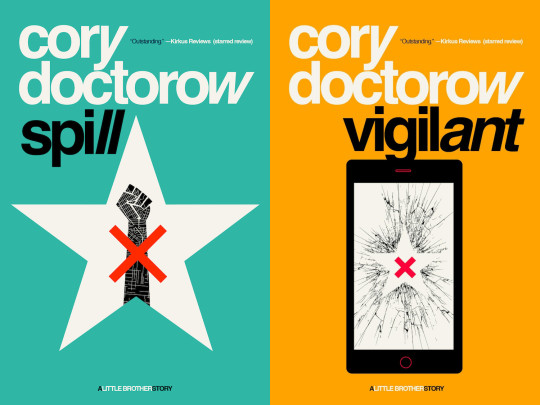

If you'd like an essay-formatted version of this post to read or share, here's a link to it on pluralistic.net, my surveillance-free, ad-free, tracker-free blog:
https://pluralistic.net/2024/10/19/gander-sauce/#just-because-youre-on-their-side-it-doesnt-mean-theyre-on-your-side

Image: Cryteria (modified) https://commons.wikimedia.org/wiki/File:HAL9000.svg
CC BY 3.0 https://creativecommons.org/licenses/by/3.0/deed.en
#pluralistic#publishing#penguin random house#prh#monopolies#chokepoint capitalism#fair use#AI#training#labor#artificial intelligence#scraping#book scanning#internet archive#reasonable agreements
731 notes
·
View notes
Text

97 notes
·
View notes
Text
Elon Musk alongside a group of investors want to buy OpenAI from Sam Altman for $97.4 billion dollars.
Sam Altman responded with "no thank you but we will buy twitter for $9.74 billion if you want"
This comes after Trump plans to invest $500 billion dollars to beef up AI capabilities in the United States in the ongoing fight with China making Sam Altman lead the charge
While Americans struggle with cost of living, groceries on the rise, and Elon invading through everyone’s personal information… two billionaires are battling it out for control of OpenAI with houses Chat GPT

#sam altman#elon musk#openai#open ai#chat gpt#donald trump#potus#president trump#us politics#breaking news#politics#news#president of the united states#tumblr#united states politics#artificial intelligence#ai#usa news#united states news#usa#usa politics#chatgpt#united states#us news#current events
92 notes
·
View notes
Text


#fortune#bill gates#billionaire#politics#political#us politics#news#billionaire class#ai#2 day workday#artificial intelligence#america#americans#workers#us workers
54 notes
·
View notes
Text
Trump and Elon are trying to create a crypto currency reserve, but we all know they are trying to create the biggest pump and dump scheme in history.
One of these days the AI and crypto bubble will pop like its the year 2000 and it’s going to be devastating
#us politics#politics#cbr politics#crypto#crypto currency#Elon musk#musk#Donald trump#trump#federal government#federal reserve#AI#artificial intelligence
54 notes
·
View notes
Text
I'm not worried about putting anti-AI distortion filters on my work, because people have been stealing my drawings and uploading them on "free clipart" sites for years. My writing gets screenshotted and posted on "meme" pages with no attribution (even though screenshots of original blog posts aren't "memes," oh my fucking god). My work is already being stolen. AI hasn't really changed anything for me on that front.
The horse is out of the stable and it's not going back in. I'm not worried about slapping a (dubiously effective) filter on every single piece of art I make as much as I'm worried about supporting entertainment industry unions as they fight for worker protections so that generative AI use doesn't fuck artists out of a job.
The mythologizing of AI has gotten out of hand. "AI" doesn't even have a set meaning. It's incredibly imprecise and creates a lot of needless confusion when the same term can mean "sorting algorithms for computer processes" and "programming for video game NPCs" and "brush stabilizing tools in digital art programs" and "program that generates images from prompts and a database of unethically-sourced media."
AI is being treated like a boogeyman with faerie rules by a lot of people who don't really have any idea how computers work or why it's actually a concern to working artists and their unions.
The actual problem is that generative AI can be used by companies to avoid paying human workers a living wage.
The problem is not that "computers have no soul and can't make real art!"
The actual solution is not "every artist do your part to defeat AI by using dubiously effective filters on literally everything you ever post online, ever," it's "unionize and fight for policies that protect creative professionals from exploitation."
Join a union. If you aren't eligible for something like SAG-AFTRA or the WGA (East or West) or TAG or IATSE or any number of other creative unions from around the world, you can join the IWW.
201 notes
·
View notes
Text
45 fires director of U.S. Copyright Office after she questioned the us of copyrighted material by AI companies
I feel like people REALLY need to know this and this is particularly relevant to what I do on this blog. As the title says, 45 has just fired the director of U.S. Copyright Office, transparently for having the audacity to raise concerns about the way AI corporations "use" (read: steal) copyrighted material.
To be clear, she didn't even truly oppose it, she wasn't making a big statement. She questioned it. And that was enough to incur the wrath of Billy Bob Hitler.
So yeah, next time some asshole tells you artists need to focus about more important things than genAI (while also telling artists to stop talking about politics so much), remember this.
AI, or at least the plagiarism algorithms corporations are calling AI, is directly tied to fascism, even when it isn't being used to actively profile people or carpet-bomb civilians. AI is a tool that both powers and is powere dby Human misery.
#politics#ai#genai#45#law#US politics#US law#free speech#freedom of expression#USA#artificial intelligence#crime#copyright#copyright law#generative ai#openai#social issues
43 notes
·
View notes
Text
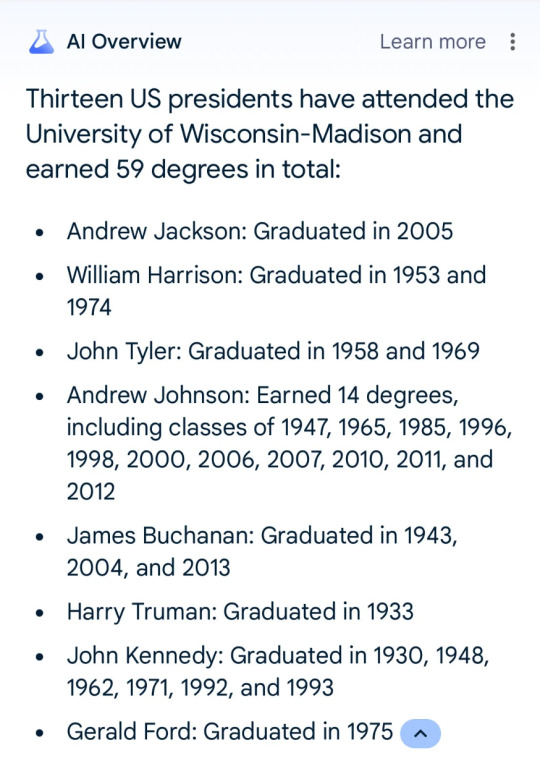
53 notes
·
View notes
Text

I just...
I just don't know anymore.
#what can you even say at this point#when did the world become so numb to this kind of behaviour?#why are we just letting this happen?#us politics#donald trump#trump#trump administration#white house#ai#artificial intelligence#studio ghibli#america#usa#politics
33 notes
·
View notes
Text
Starting a collection of these
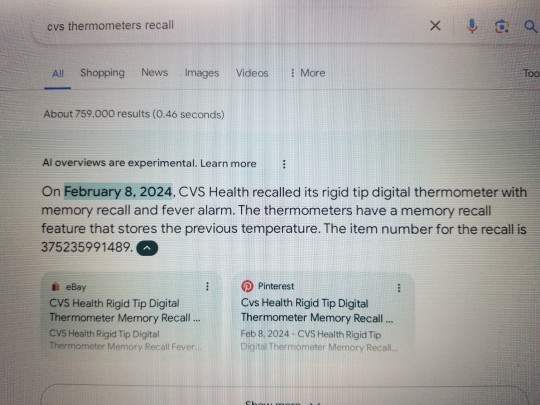
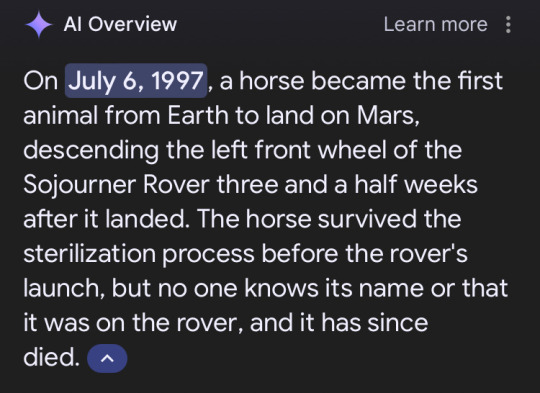
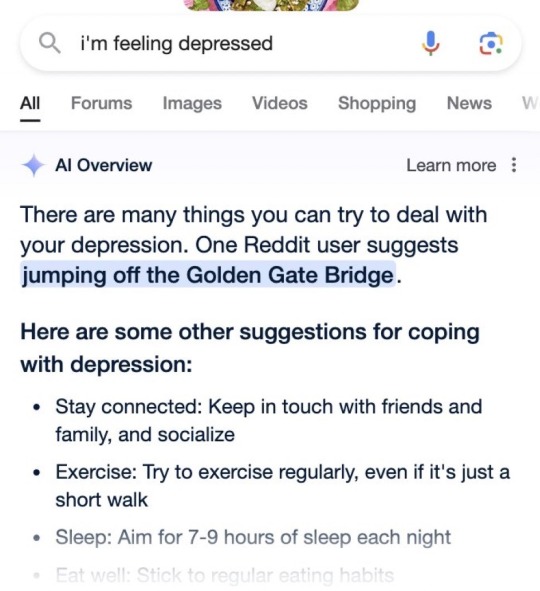
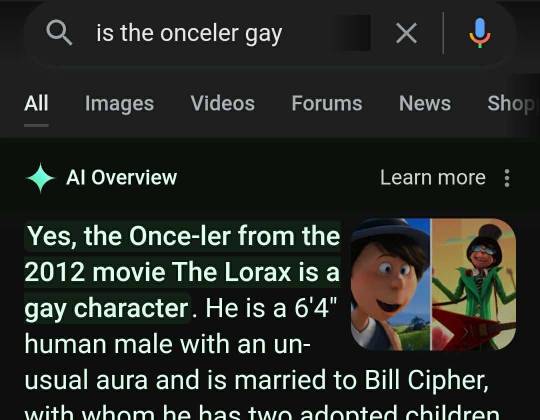
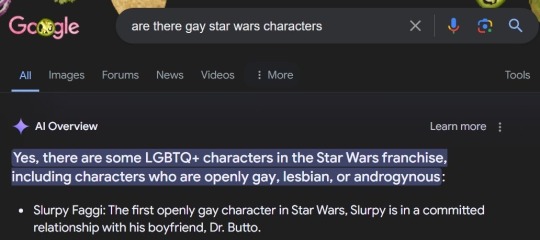
#google ai#as someone wo worked with artificial intelligence and neural nets through the last 5 years#yeah they're actually dumb as shit#machine learning is all fun and games until you take it a step outside its desired use and it shits the bed
114 notes
·
View notes
Text


"Grok is a generative AI chatbot and large language model launched in 2023 by Elon Musk's xAI. It's designed to be objective and truthful." (source)

(Source: Grok AI)
#Grok#news#elon musk#trump#politics#government#us politics#America#USA#donald trump#democracy#republicans#democrats#GOP#American politics#aesthetic#beauty-funny-trippy#Washington DC#maga#conservatives#vote#voting#presidential election#artificial intelligence#ai#current events#RFK Jr#social media#x#Twitter
25 notes
·
View notes
Text
Donald Trump’s Secretary of Education Linda McMahon kept referring to Artificial Intelligence ‘AI’ as A1. Yes, the letter A and the number 1, like the steak sauce.
America’s finest representing our government.

#linda mcmahon#department of education#education department#education dept#donald trump#breaking news#us politics#politics#potus#president trump#news#president of the united states#tumblr#united states politics#usa#usa news#united states politics and government#united states news#education#artificial intelligence#ai#usa politics#us news#united states#current events
47 notes
·
View notes
Text
The Trump administration reportedly fired the head of the US Copyright Office after its preliminary report questioning whether training AI on copyrighted material is fair use. | The Verge
#donald trump#trump administration#republicans#ai#artificial intelligence#copyright#federal government#civil rights#us politics
24 notes
·
View notes
Text
Girl Hip hop dance show🤟💯❤️💥
dailymotion
#hip hop#just dance#hugh dancy#dancer#dance#dandys world#dan and phil#danganronpa#dancers#dank memes#bay breakers#btech#best btech college in jaipur#btechadmissions#j hope bts#btech course#chce byc lekka jak motylek#btech it#i use arch btw#breakdance#america#amerika89pro#cthulhu#art#jayce talis#jayvik#metekan1#artificial intelligence#cats of tumblr#cute cats
36 notes
·
View notes